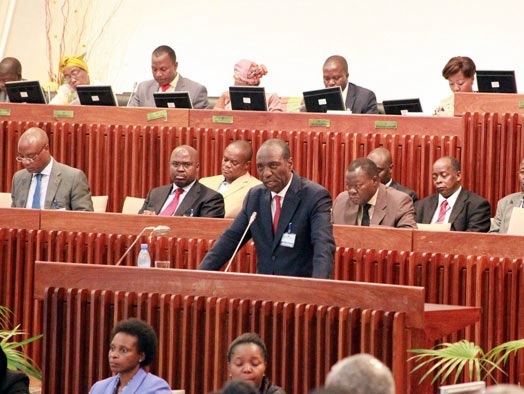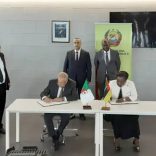High hopes for Mozambique’s review of environmental policy and law
Government will only honour debts that are”in the public interest” – PM tells parliament

File photo / Prime minister Carlos Agostinho do Rosario addressing parliament
The Mozambican government will only honour debts if it is proved that the money “has been used for purposes that are in the public interest”, declared Prime Minister Carlos Agostinho do Rosario on Thursday.
Speaking in the Mozambican parliament, the Assembly of the Republic, on the second day of a debate on the General State Account (CGE) covering the 2015 financial year, Rosario also made it clear that servicing the country’s debts must not be at the expense of its development.
“We shall continue to observe a balance between the need to honour debt servicing and the imperative to continue financing priority action for economic and social development”, he said.
Some opposition deputies had protested that the mere mention in the CGE of the guarantees issued illicitly by the previous government, headed by President Armando Guebuza, for loans taken out by the security-related companies Proindicus and MAM (Mozambique Asset Management) from European banks somehow legalized those debts.
That was certainly not Rosario’s understanding. He told the Assembly that the inclusion of information on the two guarantees in the CGE for 2015 “was necessary to guarantee control and monitoring of the guarantees by the Administrative Tribunal (the body that verifies the legality of public expenditure), in accordance with the law that set up the State Financial Administration System (Sistafe)”.
Control of the guarantees by the Tribunal, he stressed, “does not replace or hinder the independent audit that is currently under way”.
The guarantees for Proindicus, MAM and a third company, Ematum (Mozambican Tuna Company) cover a total of over two billion US dollars in loans from European banks (mainly Credit Suisse and VTB of Russia). While the Ematum loan was public knowledge, since it took the form of a bond issue on the European market, the other two loans and their guarantees were kept in deepest secrecy (which is doubtless why they were not mentioned in the State Accounts for the years when they were issued, 2013 and 2014).
When press reports tore away the veil of secrecy from Proindicus and MAM, in April 2016, the International Monetary Fund (IMF) and Mozambique’s other western partners said the government had hidden the true scale of the country’s debt situation, and reacted by suspending further financial aid. All 14 donors who had been providing direct support for the Mozambican state budget halted disbursements.
The key condition for restoring normal relations with the IMF is an independent, international audit of Ematum, Proindicus and MAM, and this is currently being undertaken by the London branch of the American company Kroll. The audit report must be submitted to the Mozambican Attorney-General’s Office by 28 April.
Rosario’s remarks made it clear that the government’s current refusal to service the debts of the three companies could become definitive if the audit shows that the money was not used “for purposes that are in the public interest”.
Despite Rosario’s assurances, opposition deputies continued to insist that there is something illegitimate about even mentioning Proindicus and MAM in the CGE. Venancio Mondlane, of the Mozambique Democratic Movement (MDM), described the Ematus, Proindicus and MAM debts as ”illegal, illegitimate and immoral”, and claimed that, by mentioning them in the CGE, the government “is sanctifying a satanic debt”, and “now we are all obliged to accept this debt”. He even suggested that President Filipe Nyusi should be jailed because off the scandal.
But in fact the government is already refusing to pay the debts incurred by the three companies. In May 2016, a 176 million dollar payment on the MAM loan fell due, and the government did not pay it. In January this year, the government should have paid 59.8 million dollars in interest to the Ematum bondholders, but did not. An in March, 119.2 million dollars in repayment of the Proindicus loan from Credit Suisse fell due. Proindicus could not pay, and the government did not step in to assist it.
Yet, flying in the face of this evidence, both the MDM and the larger opposition party, the rebel movement Renamo, insisted that, in the words of Renamo deputy Ivan Mazanga, “the government wants all Mozambicans to pay these debts”.
Mazanga also noted that the guarantees issued for the three companies smashed the ceilings on guarantees included in the budget laws of 2013 and 2014. A further reason for regarding the guarantes as invalid was that they, and the loan agreements, had never been translated into the country’s official language, Portuguese. These points are not in dispute.
Faced with complaints over waste and mismanagement in public companies, and companies in which the government holds shares, Rosario promised “we shall continue to implement reforms in these companies, in order to reduce fiscal risks, and improve the financial solidity and competitiveness of the State business sector”.
The government had begun to restructure the companies, he said, and this restructuring could take several forms, including opening the companies up to new injections of company, changing their strategic focus and simply winding them up. If necessary, the government would identify “strategic partners” to run the companies.
Rosario said that budget execution is being decentralized to district level, and of the 154 districts in the country, 129 are now executing their budget locally. As a result, the Prime Minister said, “more than 70 per cent of public expenditure is executed directly – that is, the payments go from the treasury account to the bank account of the beneficiary without any middlemen, which strengthens transparency in the management of public finances”.
The Assembly’s Plan and Budget Commission has now been charged with drawing up a resolution on the CGE, which will be approved later in the parliamentary sitting. In line with past practice, the resolution will not simply approve the CGE, but will contain a series of instructions to the government for improving future State Accounts.













Leave a Reply
Be the First to Comment!
You must be logged in to post a comment.
You must be logged in to post a comment.